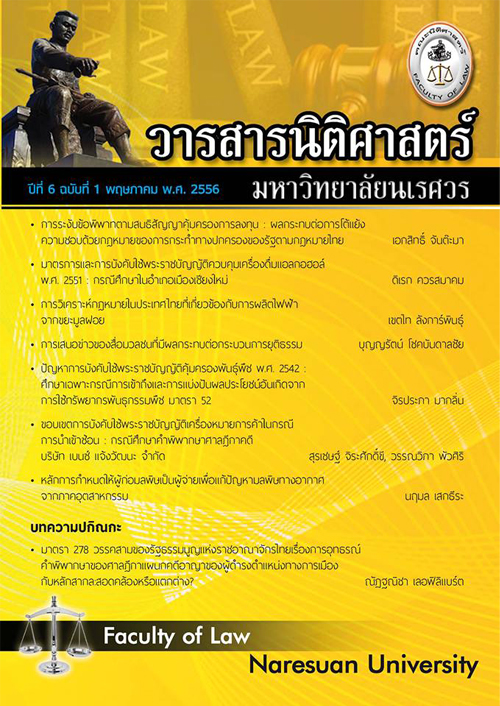An Analysis of Laws in Thailand Governing the Production of Electricity Using Waste Products
Main Article Content
Abstract
At present, the laws in Thailand which governs the production of electricity using waste products are deemed to be unnecessarily burdensome and often times confusing. There are simply too many laws which have created an unmanageable situation. Moreover, the definition and classification of what constitutes “waste” by law, as determined by each governmental unit, varies greatly and often times, contradict one another. Therefore, to develop an environment which will encourage development and innovation in this growing sector, it is vital for the government to have clear and concise laws which are consistent, logical, and understandable to all. There must also be a sincere effort to reduce bureaucratic intervention. This will require that the various governmental units cooperate fully to ensure the growth and sustainability of this important industry. From research already conducted, the following are the findings as of this writing
1. The definition of “waste” products, as defined by existing laws, differs from the definition recognized in academia and certain academic journals. The definition of “waste” appears to vary depending upon what a particular proposal requires.
2. The management of waste, by law, is divided into two distinct categories : local level waste, or “community waste,” and industrial level waste, called “industrial waste.” Different laws and standards are applied to each type of waste categories.
3. In many countries, there appear to be laws which govern primarily “collection waste” and “the processing of waste.” In Thailand, the main laws (although not yet formally mandated or announced) include the following : (1) the collection waste law, (2) the reuse waste law, (3) the recycle waste law, and (4) the process of waste-to-fuel law.
Article Details
References
สุนีย์ มัลลิกะมาลย์. การจัดการขยะชุมชนอย่างมีประสิทธิภาพ: รูปแบบและมาตรการทางสังคมเศรษฐศาสตร์ การจัดการและกฎหมาย เพื่อแก้ไขปัญหาขยะชุมชน. กรุงเทพฯ : สำนักงานกองทุนสนับสนุนการวิจัย, 2543.
สำนักงานคณะกรรมการสิ่งแวดล้อม. นโยบายและมาตรการพัฒนาสิ่งแวดล้อมแห่งชาติ. กรุงเทพฯ: กระทรวงวิทยาศาสตร์เทคโนโลยีและสิ่งแวดล้อม, 2540.
สถาบันดำรงราชานุภาพ สำนักปลัดกระทรวงมหาดไทย. รายงานผลการวิจัยเรื่องแนวทางความร่วมมือระหว่างประชาชนกับภาครัฐในการแยกประเภทมูลฝอยก่อนนำทิ้ง. เอกสารวิชาการ สดร. 07/2540. กรุงเทพฯ : เสมาธรรม, 2540.
กรมพัฒนาพลังงานทดแทนและอนุรักษ์พลังงาน. การผลิตพลังงานจากขยะ. กรุงเทฯ :กระทรวงพลังงาน, 2552.
สภาทนายความแห่งประเทศไทย. รวมกฎหมายสิ่งแวดล้อม. นนทบุรี : บริษัทมายด์ พับลิชชิ่ง จำกัด, 2538.


